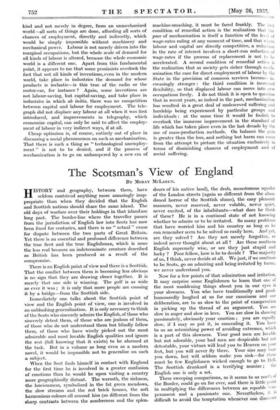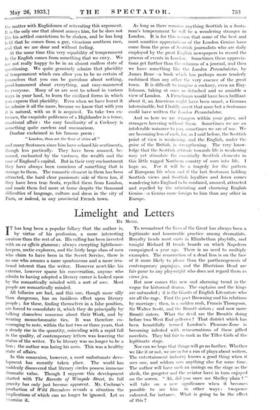The Scotsman's View of England
BY MORAY MCLAREN'.
HISTORY and geography, between them, have seldom contrived anything more amusingly inap- propriate than when they decided that the English and Scottish nations should share the same island. The old days of warfare over their holdings in that island are long past. The border-line where the traveller passes from the jurisdiction of English law into Scots has now been fixed for centuries, and there is no " actual " cause for dispute between the two parts of Great Britain. Yet there is an essential and profound difference between the true Scot and the true Englishman, which is none the less real because an indeterminate creature described as British has been produced as a result of the compromise.
There is an English point of view and there is a Scottish. That the conflict between them is becoming less obvious is no sign that they are drawing closer together. It is merely that one side is winning. The gulf is as wide as ever it was ; it is only that more people are crossing it by a bridge—from the Scottish side.
Immediately one talks about the Scottish point of view and the English point of view, one is involved in an unblushing generalization. It is only necessary to think of the Scots who sincerely admire the English, of those who sincerely detest them, of those who are jealous of them, of those who do not understand them but blindly follow them, of those who have wisely picked out the most admirable and most lovable English qualities and ignore the rest (full knowing that it exists) to be alarmed at the task. But in a volume as long even as a modern novel, it would be impossible not to generalize on such a subject.
When the Scot finds himself in contact with England for the first time he is involved in a greater confusion of emotions than he would be upon visiting a country more geographically distant. The warmth, the richness, the lusciousness, symbolized in the fat green meadows, the slow streams and the red brick houses, the soft harmonious colours all around him (so different from the sharp contrasts between the sombreness and the splen- dours of his native land), the drab, monotonous squalor of the London streets (again so different from the aban- doned horror of the Scottish slums), the easy pleasant manners, never reserved, never voluble, never quiet, never excited, of the inhabitants—what does he think of these? He is in a continual state of not knowing whether to admire or to be irritated. So many problems that have worried him and his country as long as he can remember seem to be solved so easily here. And yet, are they solved ? Are they not merely forgotten, or indeed never thought about at all ? Are these southern English supremely wise, or are they just stupid and lucky ? Poor fellow, how is he to decide ? The majority of us, I think, never decide at all. We just, if we continue to be Scots, go on admiring and being irritated by turns; we never understand you.
Now for a few points of that admiration and irritation. It may surprise some Englishmen to learn that one of the most maddening things about you in our eyes is your slowness. You who have traditionally and good- humouredly laughed at us for our canniness and our deliberation, are to us slow to the point of exasperation in picking up the thread of an argument. You are slow in anger and slow in love. You are slow in showing passionately, obviously your emotion ; you are equally slow, if I may so put it, in concealing it. You have to us an astonishing power of avoiding extremes, which is a part of this slowness. Your good men are lovable but not adorable, your bad men are despicable but not detestable, your virtues will lead you to Heaven on your feet, but you will never fly there. Your sins may bear you down, but will seldom make you sink—for there must be few Englishmen wicked enough to go to Hell. The Scottish drunkard is a terrifying maniac ; the English one is only a sot. These sweeping comparisons, so it seems to us north of the Border, could go on for ever, and there is little point in multiplying the differences between .an equable tem- perament and a passionate one. Nevertheless, it Is difficult to avoid the temptation whenever one discusses the matter with Englishmen of reiterating this argument. It is the only one that almost annoys him, for he does not like his settled convictions to be shaken, and he has long held that' he comes from a gay, vivacious southern race, and that we are dour and without feeling.
At the -same time this very equability of temperament in the English comes from something that we envy. We are not really happy to be in an almost endless state of questioning. We quite genuinely admire that placidity of temperament which can allow you to be so certain of voursehres that you can be garrulouS about nothing,- good-humoured about everything, and easy-mannered to everyone. Many of us are sent to school in various ways in your' land, to learn the civilized forms in which you express that placidity. Even when we have learnt it we admire it all the more, because we know that with you it is natural, with us it is acquired. To take two ex- tremes, theexquisite politeness of a Highlander is a tense, emotional affair : the easy familiarity of a Cockney is something quite careless and unconscious.
Dunbar exclaimed in his famous poem :
" London, thou art the flour of cities all
and many Scotsmen since him have echoed his sentiments, though less poetically. They have been amazed, be- mused, enchanted by the vastness, the wealth and the ease of England's capital. But in their very enchantment they have always been conscious of something that is strange to them. The romantic element in them has been attracted, the hard clear passionate side of them has, if they have been true Scots, repelled them from London, and made them feel more at home despite the thousand difficulties of language, culture and dress in the city of Paris, or indeed, in any provincial French town. As long as there remains anything ScOttigh in a Scots- Man's temperament he will be a wondering stranger in London. It is for this reason that some of the best and Most sensitive appreciations of the London Genius have Come from the pens of Scottish journalists who are daily employed by the great English newspapers to record the process of events in London. Sometimes these apprecia- tions get further than the columns of a journal, and then we have something like the London Perambulator, by James Bone—a book which has perhaps more tenderly enshrined than any other the very essence of the great town; It is difficult to imagine a cockney, even an Eng- lishman, taking at once so detached and so amiable a View of London. A Frenchman would have been brilliant about it, an American might have been smart, a German interminable, but I boldly assert that none but a Scotsman could have written the London Perambulator.
And so here we arc strangers within your gates, and strangers hovering without them. Sometimes we are an intolerable nuisance to you, sometimes we are of use. We arc becomingless of each, for, as I said before, the Scottish point of view is weakening, and the English, under the guise of the British, is strengthening. The very know- ledge that the Scottish attitude towards life is weakening may yet stimulate the essentially Scottish elements in this little ragged Northern country of ours into life. I hope so. For it will be a tragedy for the pattern of European life when and if the last Scotsman holding Scottish views and Scottish loyalties and loves comes wandering into England to be confused, amazed, attracted and repelled by the infuriating and charming English Genius—a Genius more foreign to him than any other in Europe.

















































 Previous page
Previous page